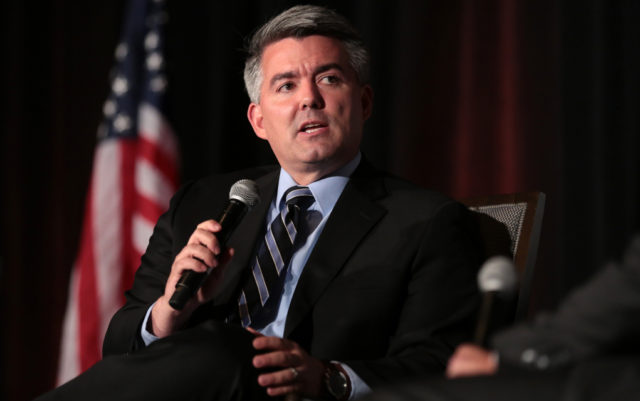
Colorado Senator Cory Gardner recently opened up about his interactions with President Trump regarding former Attorney General Jeff Sessions’ decision to scrap the Cole Memo and what followed.
Gardner told an interviewer on a Cannabis Economy podcast that Trump called for undoing Sessions’ decision as soon as Gardner raised the issue with him.
Gardner said he raised the issue with Trump following an Oval Office meeting on trade, but that before he could finish a sentence Trump interrupted him to say “we need to undo this” and Sessions “needs to stop this.”
The Cole Memo, which was issued by the Obama Justice Department after Colorado and Washington voted to legalize pot, said the department wouldn’t prosecute people in states that had legalized recreational or medical marijuana under the Federal Controlled Substances Act, so long as they were abiding by state laws.
Sessions repealed the memo, apparently hoping to crush the legalization movement by enforcing federal laws against marijuana in states where it was legal.
Gardner said Trump wasn’t buying it.
“It was very clear to me at that point that there was a disagreement between the president and the attorney general on this,” Gardner said, adding that Trump told him, “I don’t like this, this isn’t something I support,” but that he felt it was too late to reverse the decision.
“This sounds like something my grandpa said in the 1950s,” was an exact phrase Trump used, according to Gardner.
That convinced Gardner that he had an ally in the president.
Gardner raked Sessions over the coals in a speech on the Senate floor and then started blocking Justice Department nominees until Sessions relented. Sessions never did. But after two or three months, Trump called Gardner and asked him to ease off because there was one nominee in particular he wanted to confirm.
Gardner said he would, in return for Trump’s support for a bill he was sponsoring with Senator Elizabeth Warren (D-Massachusetts) to exempt state-legal marijuana activity from enforcement under the Controlled Substances Act.
Trump agreed and subsequently told reporters that he “really” supported the legislation.
The bill was named the Strengthening the Tenth Amendment Entrusting States (STATES) Act. The Tenth Amendment states that “The powers not delegated to the United States by the Constitution, nor prohibited by it to the States, are reserved to the States respectively, or to the people.”
Recently, the amendment has been more frequently invoked by both Republicans and Democrats who are attempting to get states to pass legislation they couldn’t get through Congress. Invoking the amendment in support of bipartisan legislation to write the Cole Memo into federal law was an adroit political move, and one that could provide Republican senators from socially conservative states with some political cover if they choose to support the STATES Act.
Gardner and Warren unsuccessfully attempted to get the STATES Act attached as an amendment to the criminal justice reform law that was passed at the end of the last session of Congress.
At the time Gardner announced that he would not give up the fight, so he will presumably re-introduce it at some point during the current Congress.
He might have a better chance of getting some traction for the legislation this time. Diehard pot prohibitionist Senator Charles Grassley (R-Iowa) had stepped down as Chairman of the Senate Judiciary Committee. The new Chairman is Senator Lindsey Graham (R-South Carolina). Graham is considered much more open-minded on marijuana issues, especially medical marijuana issues, than Grassley was. And while he isn’t considered a supporter of recreational marijuana, he is likely more open to giving Gardner’s bill a hearing if and when it’s re-introduced.
• • • •
Trust but verify department: According to the website Marijuana Moment, researchers Michele Baggio of the University of Connecticut and Alberto Chong of Georgia State University have uncovered smoking-gun evidence (so to speak) that marijuana causes the munchies. Using data from thousands of retail scanners, the pair discovered that in counties located in states that legalized recreational marijuana, “monthly sales of high-calorie food increased by 3.1 percent for ice cream, 4.1 percent for cookies, and 5.3 percent for chips.”
“The increase in sales starts at the time the legislation becomes effective,” they found, but “the effect slightly decreases in the semesters thereafter for ice cream and chips, but not for cookies.”














